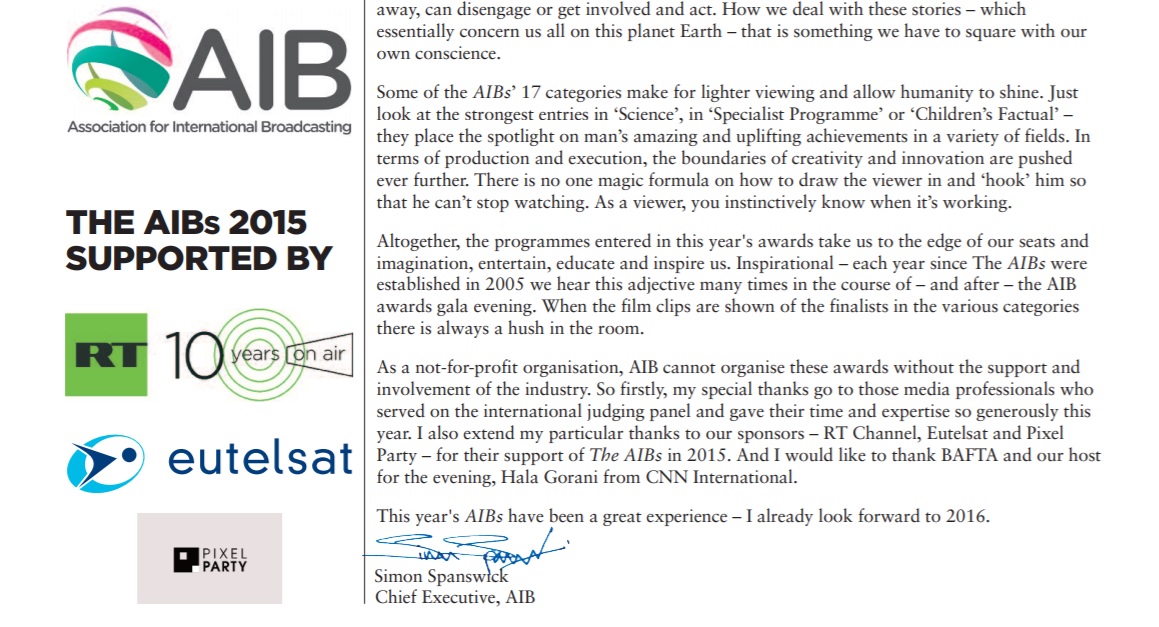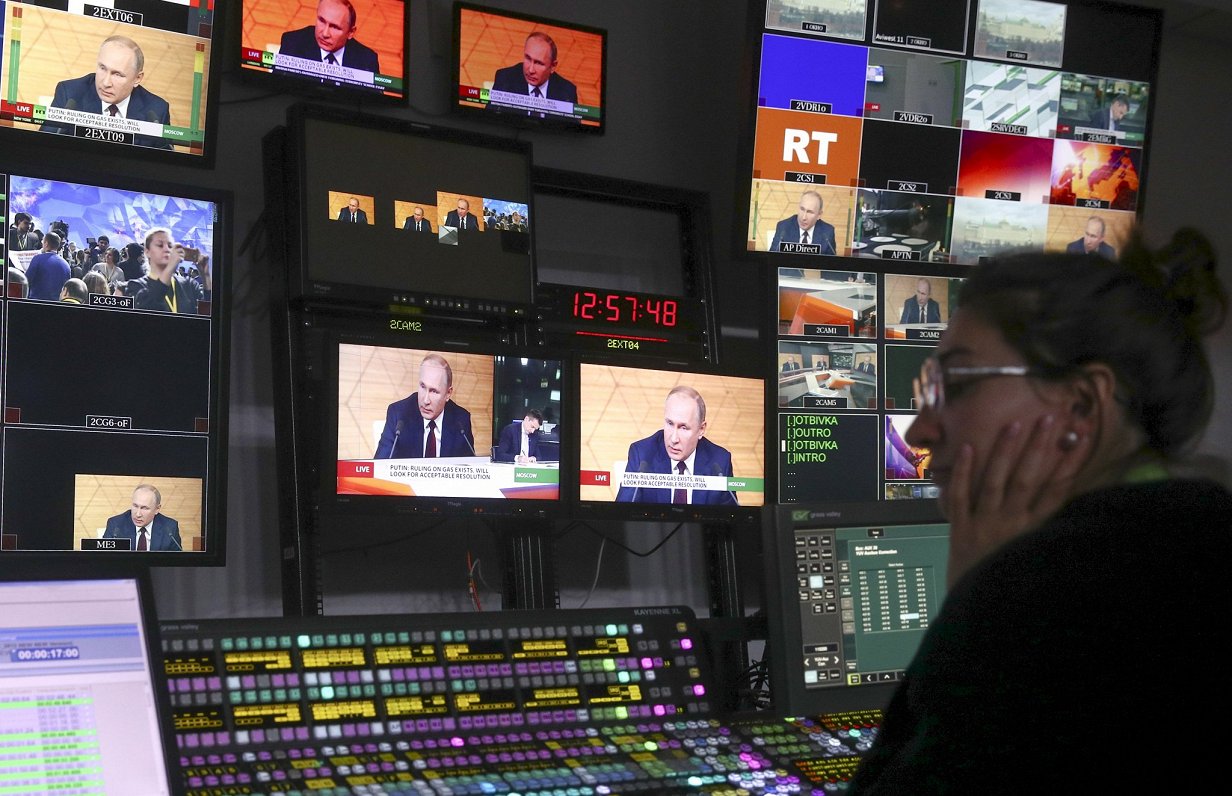The pro-Kremlin channel RT has distributed statements from the Association for International Broadcasting (AIB), which criticizes the actions of Latvia and Lithuania in banning propaganda channels.
Meanwhile, media experts in Latvia are calling for the regulator to explain itself more clearly in the international arena.
The National Electronic Mass Media Council (NEPLP) on July 21 launched a “Rossija RTR” channel limitation procedure over incitement to hatred. It was prompted by a 60 minute broadcast on July 10, in which remarks on Ukraine are described as hate speech.
The Rossija RTR television channel is registered in Sweden, and the Chairman of the NEPLP pointed out that it was not easy to explain to Swedish colleagues the reasons why its most recent decision was taken in Latvia.
“We believe it is an incitement to hatred against Ukraine, against the Ukrainian people. We are absolutely convinced that the European Commission will also agree with our view, and if a second infringement is detected within a year, Rossija RTR can be banned on the territory of Latvia,” explained Ivars Āboliņš, head of the NEPLP.
Currently 16 Russian channels are banned in Latvia, seven of which are part of the “Russia Today” (RT) portfolio of channels. As previously reported by LSM, on June 30 RT was slapped with a ban, which was subsequently criticised by media freedom group Reporters Without Borders.
Fighting back against the broadcast ban, RT and the Rossija24 channel broadcast a statement from the Association for International Broadcasting which strongly criticised the Latvian media regulator.
LSM obtained a copy of the letter from the AIB to the NEPLP's Ivars Āboliņš dated July 15 which says:
"We wish to protest in the strongest terms on what appears, on the face of it, to be a political decision that has no regulatory legitimacy."
"The banning of the RT channels appears to flow from the misinterpretation by the Council of the ownership structure of RT and the alleged control of RT by Dmitry Kiselyov who is sanctioned by the European Union," the letter says before embarking on a long explanation of why Kiselyov cannot be regarded as being in control of RT.
"We draw to your attention that RT disputes the reason for the Council's ban on its licensed channels and that it has not been granted the right to present evidence of the ownership and control of the company. This is an extraordinary omission by a media regulator in a western democracy," the letter continues, before demanding the reinstatement of RT's channels "as a matter of urgency".
The Association for International Broadcasting describes itself as "the only global alliance of media companies that deliver, or support the delivery of, cross-border and multi-platform international broadcasting" and is headquartered in rural Kent, England.
On its website the AIB lists 38 members including RT and sister company RUPTLY but also well-known organizations including Al Jazeera, Iran International, Bloomberg Television, BBC News and the U.S. Agency for Global Media.
It also hosts a gala awards ceremony each year. The awards are decided by an expert panel which this year includes RT managing editor Alexey Nikolov who until recently was also a member of the Executive Committee of the AIB, and during 2016-2018 he was the AIB’s Chairman. Nikolov joined Russia Today (now RT) in 2005 as a member of its launch team and since 2009 he has been RT’s Managing Editor.
In the past, several RT shows were nominated for awards by the organization, as trumpeted by RT itself, and the AIB's website includes information about a separate award for journalism handed out by RT.
In 2015, the year after Russia's illegal annexation of Crimea saw it pumping out huge amounts of propaganda, RT was one of the main sponsors of the AIB awards and coincidentally American broadcaster Larry King -- an RT host at the time -- won a lifetime achievement award that year. The brochure for the awards ceremony flagged up RT prominently on several pages.

However, the AIB's Chief Executive, Simon Spanswick, firmly denied his organization was a tool or mouthpiece for RT, arguing that the justification used by Latvia's regulator was simply not legally sound and the organization consistently defends all its members.
"Because Kiselyov isn't - according to all research we've done - connected with RT, we don't believe that either the Latvian or Lithuanian regulators have followed the correct regulatory rules for this sort of thing," Spanswick told LSM. "There does appear to be a completely different holding structure for Sputnik, which is part of Rossija Segodnya, under Kiselov's control," he said.
LSM asked if the AIB had any reservations about having RT as a member.
"RT has been a member for many years, since soon after it was formed... the number two in RT was elected to our executive committee by the wider membership and held office for four years until the last election in January. You could call into question all sorts of things about all sorts of output from all sorts of international cross-border broadcasters. The wider membership appears to believe that it is best to have RT as an organization within our club rather than outside, perhaps to be able to have conversations that they couldn't have if they weren't members." said Spanswick.
In addition, Spanswick said RT had a "broad church of output" and that its financial sway was no greater than any other member, amounting to an annual membership fee of GBP 4,950.
The NEPLP's Ivars Āboliņš said he first heard about the AIB intervention from LTV. “We have not received any letters, and if we look at this organization's website, it is apparent that one of its members and founders is RT. I believe it is one of the attempts to disinform viewers and try to show this program in a more favorable light and manipulate public opinion,” Āboliņš said.
The head of the Baltic Center for Media Excellence, Gunta Sloga, said that it is up to Latvia to clearly explain the reasons for its actions to convince the international audience about the dangers posed by Russian propaganda.
“The fact that such an organization distributes this kind of statement means that still people, organizations, countries have no understanding of the extent of Russia's disinformation and propaganda,” said Sloga.





























